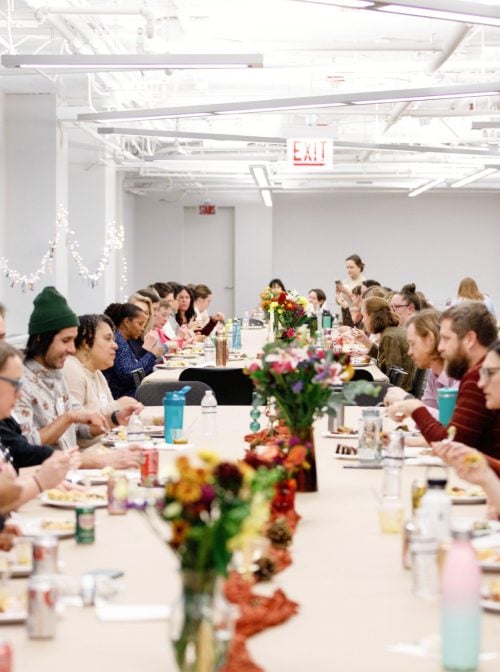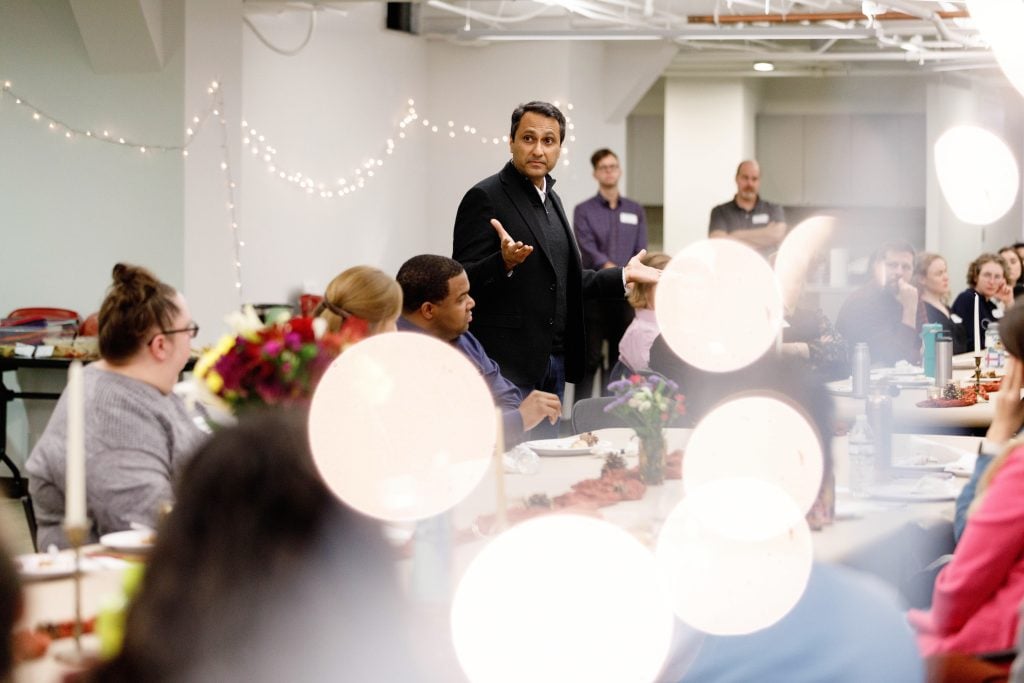“In this cold, cruel time, for our circle of kindness, let us give thanks,” recited Interfaith America president and founder, Eboo Patel. The haiku was a gentle close to his brief remarks to Interfaith America staff at the organization’s annual Thanksgiving Potluck.
The potluck tradition is an invitation to IA staff to build community, share stories, and find respite in one another’s company — especially in a moment, as IA Board member Dr. Zina Jacque put it, “when our nation feels frayed, when suspicion too easily replaces curiosity, when fear so often rises before love.”
During this time of intention and gratitude, some IA staff reflected on the dishes they brought to the shared table and the themes they carry with them through this season.
Grandma Gena Rolls
Sam Ryan
Grants Coordinator

I’m thankful for my family, friends, and the goodness around me. I’m thankful for faith and the knowledge that, as my father-in-law says, “It will all be alright in the end. If it’s not alright, it’s not the end.”
This year (with significant help from my colleague and friend Meg who lent me her kitchen during my travels to Chicago) I made my family’s classic Grandma Gena Rolls. Every year for as long as I can remember, my sister, dad, and myself have made my grandma’s recipe. She died in 1975 — about twenty years before I was born. Making her rolls every year is a chance to connect with her, reflect on all my ancestors, and express gratitude for all the family that will come before and after my time on Earth.
Msakhan
Jake Shapiro
Program Manager

I am thankful to get to make impact alongside amazing people that embrace complexity and joy amidst challenging times.
I made a Palestinian chicken dish called Msakhan. This dish reflects many things that are important to me in life. It is a special dish from a special people that I care a lot about. I am an American Jew. The first time I ate msakhan, I was with Palestinian friends on terraced farmland outside the hotly contested and holy city of Hebron. They cooked the chicken over a fire and we ate with our hands, tearing off pieces of chicken with flat bread and dunking in fresh olive oil. Msakhan is traditionally made in the olive oil harvest season, a time of abundance and family. Olive trees carry so much significance for Palestinians and reflect their rootedness to the land. I felt the power of the land and the connection. As we sat they told me stories of their lives, their families, and the impact of the conflict. I felt close to them and welcome and safe. That same day I crossed through the checkpoint and spent Shabbat with Jews. I also felt welcomed and close and safe. Msakhan is a simple dish – just chicken, sumac, onions, garlic, olive oil, and bread. But if you treat each ingredient with care and respect, they create something greater than the sum of their parts – like our Thanksgiving potluck, and like our Potluck Nation.
Knowing the food, music, stories, values, and culture of others helps me to understand them, connect to them, and care about them. I have learned so much about and developed so much care for Palestinians and many other people through sharing cultures. I can’t always express myself how I want to, but I feel I can spread love through cooking and gathering others over food. I feel grateful to have shared a piece of my story, and learned the stories of others, at our IA Thanksgiving Potluck.
Biryani
Nadia Salam
Controller

The Qur’an and Hadith emphasize the importance of hospitality, generosity, and breaking bread with others as acts of worship and kindness. In my personal experience, coming together for a shared meal, such as a potluck, echoes these values. It creates an environment where differences in culture, religion, and background dissolve over shared food and conversation, fostering a sense of belonging and mutual respect.
For me, the Interfaith America Thanksgiving potluck beautifully mirrors this ethos. It reminds us that despite our unique identities, we are united in our shared humanity. By contributing Biryani — a dish rich with cultural and personal significance — I am able to share a piece of my heritage, bridging gaps and celebrating the diversity that makes America, and our workplace, a truly vibrant community.
Baingan ki sabzi
Nazish Rizwan
Program Manager

As a child, I would sit in the kitchen, mesmerized by my grandmother’s graceful hands as she sliced long, slender eggplants with care. She would fry them until they turned golden, then nestle them into a simmering pot of charred tomato sauce. The final flourish was always magical! A tempering of fragrant oil infused with crushed garlic, whole chilies, curry leaves, and cumin seeds. The aroma would fill the house, wrapping us in warmth and anticipation. This simple, hearty dish became a centerpiece of our family table — a quiet witness to countless good days. My mother carried on the tradition, and it became a taste of home I never thought I’d live without — until I moved to America. In those early days, when homesickness crept in, I longed for that familiar comfort.
This year, I brought that beloved dish to our Thanksgiving potluck. It felt like carrying a piece of my heritage into a new chapter of life. To my surprise, my colleagues loved it far more than I expected. Their appreciation filled me with such joy, and when I called my grandmother to tell her that her recipe won, she was brimming with happiness. I realized this dish had done more than satisfy hunger. It had built bridges and sparked some great conversations with my co-workers, who I am truly grateful for.




